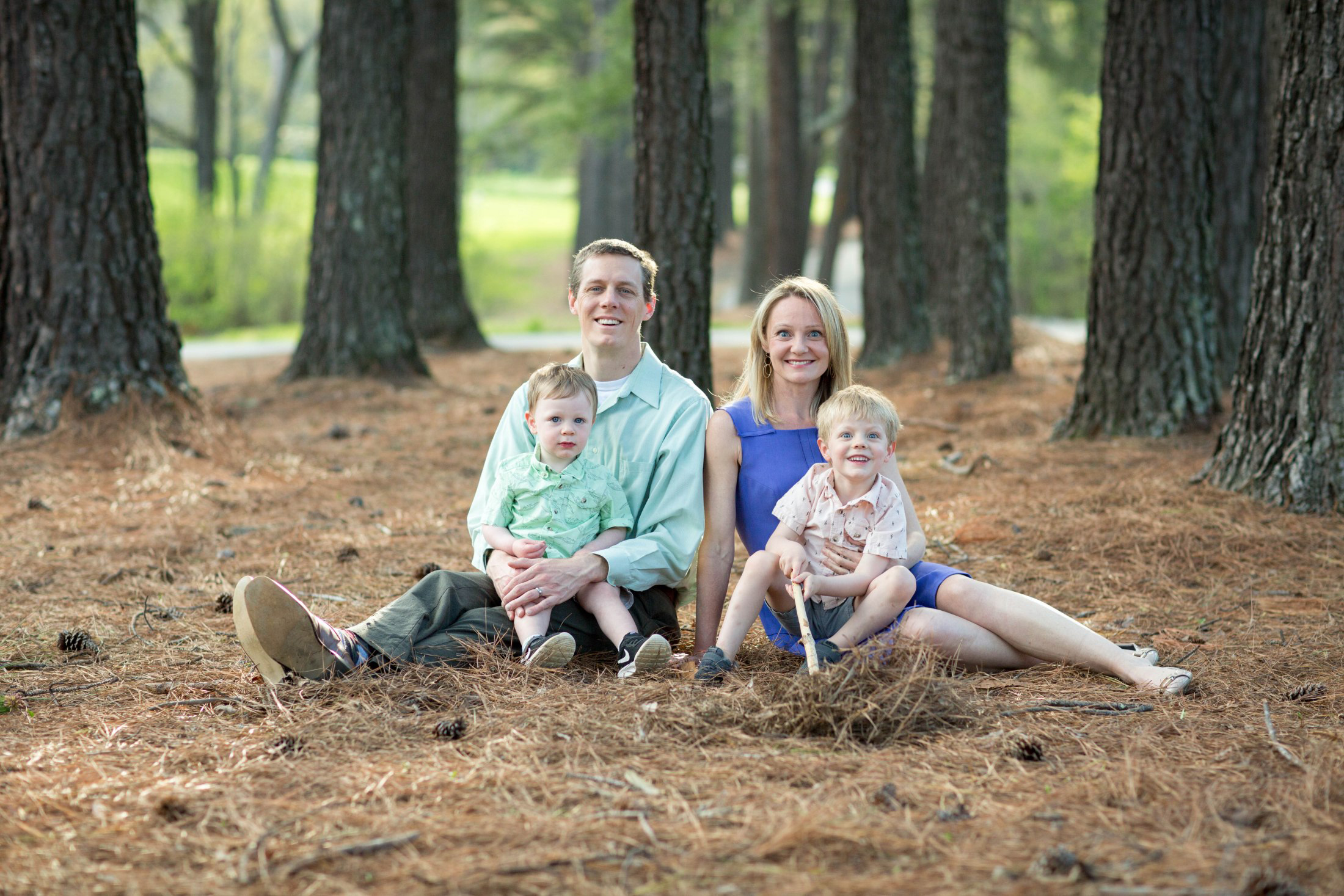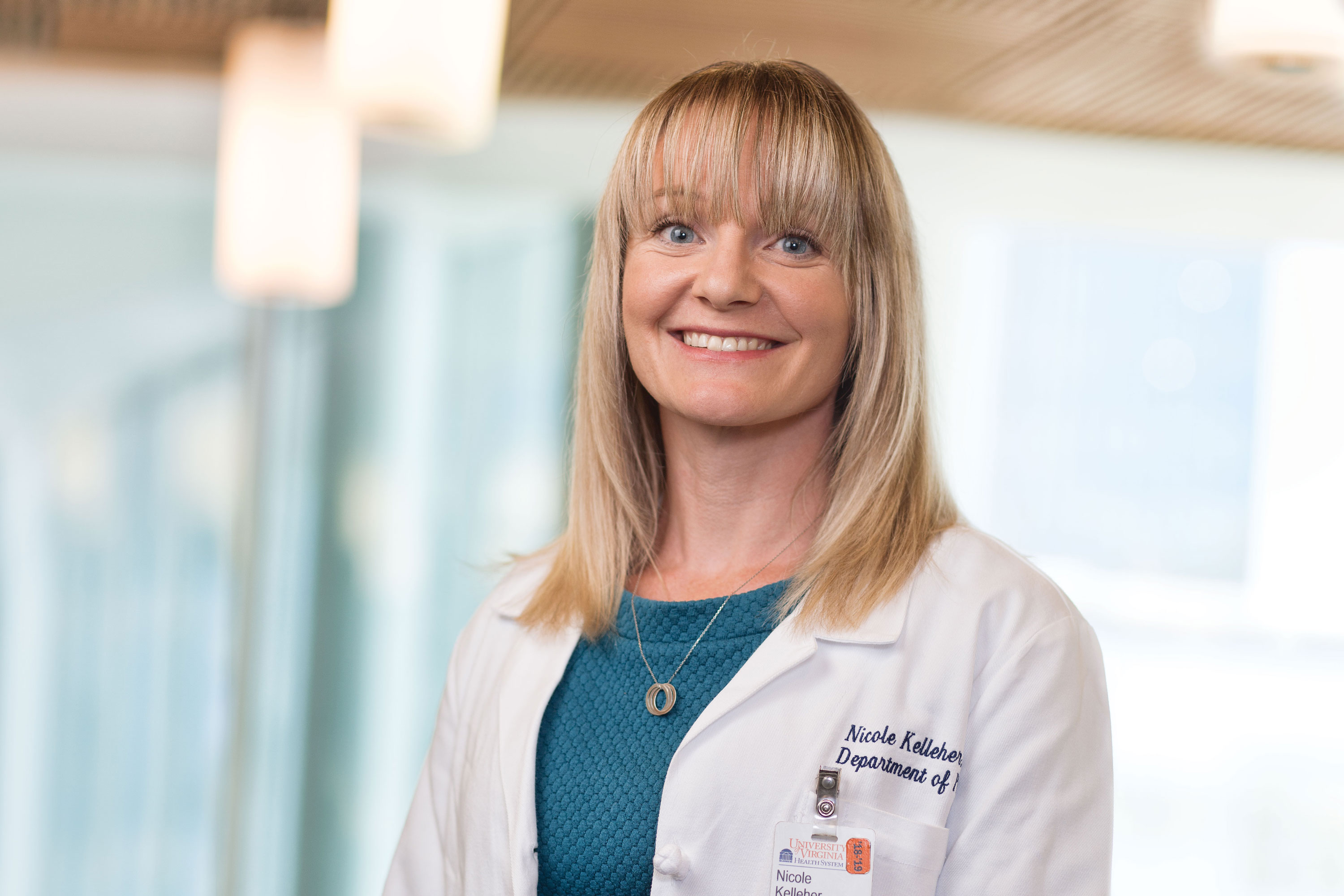Her mother, her grandmother and her grandfather each died shortly after a cancer diagnosis and all very young, in their 30s to 50s. With such a strong family history of cancer, Dr. Nicole Kelleher had long known that facing cancer could one day be her fate. But it was almost unimaginable that it could happen when she and her husband were just about to start trying for their third child.
“On March 18 (2019), my worst nightmare was realized with a breast cancer diagnosis. I was 36 with a 1- and 3-year-old – two joyful little boys, Aden and Connor,” Kelleher said. While her children were her first concern, she also immediately thought of her University of Virginia Health colleagues, and her patients – most of whom also have breast cancer.
As a physical medicine and rehabilitation doctor at the UVA Cancer Center, Kelleher is among a team of experts who care for patients who experience musculoskeletal and neurological problems following cancer treatment.
“The day I was diagnosed, the first call I made out of the doctor’s office was to Dr. [Robert] Wilder, my department chair,” Kelleher said. “The next day, I had to do clinic. I just couldn’t do it that day. ... Instantly, Dr. Wilder was overwhelmingly supportive. It was almost reflexive for him. He didn’t have to think about the right thing to do.
“I’m just so thankful that he is my chair. I can’t imagine going through this without such support. One thing you worry about is the strain on your colleagues, your department, and caring for your patients. He really eased a lot of that stress so I could focus on treatment and my family.”
Fated to Get Cancer
Even before Kelleher devoted her career to caring for cancer patients, cancer has long had a major impact on her life. In 2007, Kelleher first came to UVA to begin her first year in medical school, paying her way through as a professional triathlete. “I have won several national titles and I was a collegiate runner on a team that has seen two other teammates pass away early from cancer,” she said.
During her first year in medical school, Kelleher’s mother received a breast cancer diagnosis at age 49. She left Puerto Rico, where her husband’s job was based, to move in with her daughter and start treatment at UVA Cancer Center. Unfortunately, her cancer was an aggressive type and found after it had already spread. She died during Kelleher’s second year of medical school.
Kelleher said it was her mother’s late-stage cancer diagnosis that made Kelleher diligent about her own health. When Kelleher was only in her early 30s, she began to be closely followed at the UVA High-Risk Breast and Ovarian Cancer program, one of the nation’s first such dedicated programs and only one of its kind in Central Virginia.
Blood testing turned up no genetic defects, such as the BRCA mutation, but that didn’t mean Kelleher wasn’t among those who inherit a high risk for cancer, notes the high-risk clinic’s founder, Dr. Susan Modesitt, one of the nation’s leading authorities on high-risk cancers.

A portrait taken of Dr. Kelleher and her family two days before her surgery. (Susan Kalergis Photography)
Personalized Screening
For Kelleher, Modesitt recommended an aggressive approach to cancer screening: regular breast magnetic resonance imaging scans, which are recommended for those at high risk for breast cancer and are better than mammograms at detecting cancer, Modesitt said.
Kelleher’s MRIs were normal through her second pregnancy. But last March, right after she stopped breastfeeding her youngest child, cancer showed up.
“My cancer was found by Dr. Carrie Rochman in Radiology, and in April, I had a double mastectomy (removal of both breasts) done by Dr. Shayna Showalter. Dr. Chris Campbell did my breast reconstruction. ... My cancer was aggressive, but caught early. This is not typical for women under 40, who tend to present at later stages of disease,” Kelleher said.
“Nicole has a horrible family history of cancer,” Modesitt said. “She’s absolutely high-risk. We think something hereditary is there, but we don’t know yet what the specific cause is for her increased cancer risk. We can’t tell Nicole’s children yet if they have inherited a cancer-risk gene or genes. But research in this area is progressing rapidly, so in 20 years, and for her children or grandchildren, we hope to be able to tell them definitively what the cause is and whether they carry such a high risk.”
Modesitt hopes one day she never again has to tell a young mother that her cancer is beyond a cure. She said she is relieved that Kelleher came to her at a young age. “If one just looked at Nicole’s negative genetic testing, it is possible that someone could have missed her incredibly high-risk status and simply had her doing regular cancer screenings starting at 40 or 50,” she said.
New Level of Empathy
Kelleher missed two weeks of work following breast cancer surgery and went back with a renewed passion, as her clinic continues to grow.
“I think I have a new level of empathy for my patients,” she said. “I know I’ve always done the right thing and given them good care, but with time constraints and all of the pressures we have, it can be challenging to maintain a degree of empathy that each patient deserves. I don’t think that I had that, and now I have that on a new level. It’s an understatement. My investment in giving a personal degree of care has really gone up. ... I strongly believe that this will hopefully benefit my patients, no matter what my future holds.”
Kelleher knows she will have to continue to be diligent about her health, as colon and ovarian cancer also run in her family. But she also knows that she has the support of a family that extends well beyond a blood line.
“I have found everybody to be so supportive during my entire tenure here (for medical school, residency training and joining the faculty). I’ve never had a problem because of that support. ... Despite me being here for the last 12 years, I have never felt more a part of the UVA family as I did during that phone conversation with Dr. Wilder on the 18th of March.”
Kelleher started a blog to help other families facing cancer while raising young children. She is also training for Saturday’s Charlottesville Women’s Four-Miler, a race she won in 2010. This year, her focus isn’t on having the fastest time, but on raising the most money to support breast cancer research at UVA.
“I cannot tell you how grateful I am to the UVA high-risk program and everyone at the Cancer Center. Thanks to them, I am very likely to watch my cherished children grow and to see them graduate high school and college,” Kelleher said. “My mother’s only life’s regret was not getting to meet her grandchildren. Because of her passing and the diligence of UVA physicians, my cancer was diagnosed early. Today, I am cancer-free and have an excellent prognosis for permanent cure.”
Media Contact
Article Information
August 28, 2019
/content/facing-down-cancer-doctor-gains-deep-empathy-her-patients

